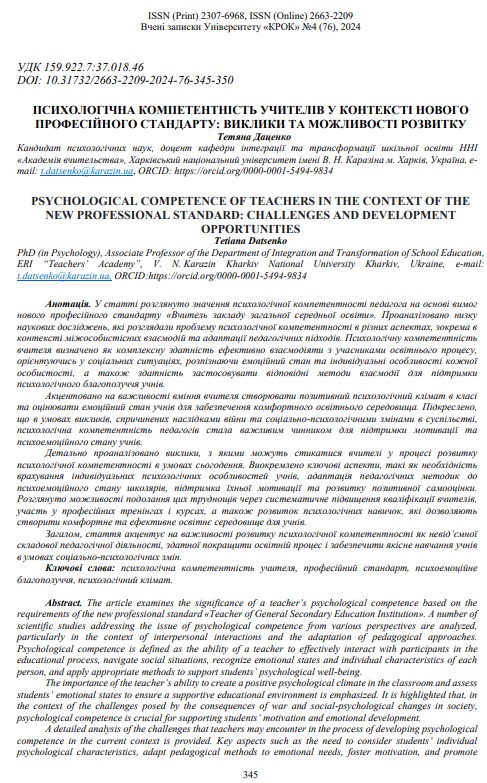ПСИХОЛОГІЧНА КОМПЕТЕНТНІСТЬ УЧИТЕЛІВ У КОНТЕКСТІ НОВОГО ПРОФЕСІЙНОГО СТАНДАРТУ: ВИКЛИКИ ТА МОЖЛИВОСТІ РОЗВИТКУ
DOI:
https://doi.org/10.31732/2663-2209-2024-76-345-350Ключові слова:
психологічна компетентність учителя, професійний стандарт, психоемоційне благополуччя, психологічний кліматАнотація
У статті розглянуто значення психологічної компетентності педагога на основі вимог нового професійного стандарту «Вчитель закладу загальної середньої освіти». Проаналізовано низку наукових досліджень, які розглядали проблему психологічної компетентності в різних аспектах, зокрема в контексті міжособистісних взаємодій та адаптації педагогічних підходів. Психологічну компетентність вчителя визначено як комплексну здатність ефективно взаємодіяти з учасниками освітнього процесу, орієнтуючись у соціальних ситуаціях, розпізнаючи емоційний стан та індивідуальні особливості кожної особистості, а також здатність застосовувати відповідні методи взаємодії для підтримки психологічного благополуччя учнів.
Акцентовано на важливості вміння вчителя створювати позитивний психологічний клімат в класі та оцінювати емоційний стан учнів для забезпечення комфортного освітнього середовища. Підкреслено, що в умовах викликів, спричинених наслідками війни та соціально-психологічними змінами в суспільстві, психологічна компетентність педагогів стала важливим чинником для підтримки мотивації та психоемоційного стану учнів.
Детально проаналізовано виклики, з якими можуть стикатися вчителі у процесі розвитку психологічної компетентності в умовах сьогодення. Виокремлено ключові аспекти, такі як необхідність врахування індивідуальних психологічних особливостей учнів, адаптація педагогічних методик до психоемоційного стану школярів, підтримка їхньої мотивації та розвитку позитивної самооцінки. Розглянуто можливості подолання цих труднощів через систематичне підвищення кваліфікації вчителів, участь у професійних тренінгах і курсах, а також розвиток психологічних навичок, які дозволяють створити комфортне та ефективне освітнє середовище для учнів.
Загалом, стаття акцентує на важливості розвитку психологічної компетентності як невід’ємної складової педагогічної діяльності, здатної покращити освітній процес і забезпечити якісне навчання учнів в умовах соціально-психологічних змін.
Завантаження
Посилання
. Бакаленко, О. А. (2018). Психологічна компетентність як ключова компетентність сучасного фахівця. Вісник Харківського університету. Серія: Теорія культури і філософія науки, 58, 132–138.
Бондарчук, О. І. (Ред.). (2012). Науково-методичні засади формування психологічної компетентності керівників освітніх організацій у системі післядипломної педагогічної освіти (наук.-метод. посібник). Київ: Педагогічна думка.
Єрмаков, Т. І. (2002). Індивідуальне розуміння концепту «Я» як ключова компетентність особистості в умовах сучасного інформаційного суспільства. Наукові студії із соціальної та політичної психології, 6(9), 200–207.
Кулаков, Р. (2023). Психологічна компетентність сучасного педагога: поняття та структура. Психологія: реальність і перспективи, 20, 90–98. https://doi.org/10.35619/prap_rv.v1i20.323
Ліннік, О., Божинський, В., Гриневич, Л., Крижановська, В., Ніколаєв, Є., & Рій, Г. (2024). Освіта під час війни: досвід українських шкіл. Аналітичний звіт. Київ: ГО «Куншт», Аналітичний центр «ОсвітАналітика» Університету Грінченка.
Міністерство освіти і науки України. (2024). Професійний стандарт «Вчитель закладу загальної середньої освіти». Міністерство освіти і науки України. https://register.nqa.gov.ua/uploads/0/646-ilovepdf_merged.pdf
Орбан-Лембрик, Л. Б. (2003). Комунікативний простір міжособистісних відносин. Вісник Прикарпатського університету. Філософські і психологічні науки, 4, 130–136.
Цільмак, О. М. (2009). Складові структури компетентностей. Наука і освіта: науково-практичний журнал Південного наукового Центру АПН України, 1–2, 128–135.
Goleman, D. P. (1995). Emotional intelligence: Why it can matter more than IQ for character, health and lifelong achievement. New York: Bantam Books.

Downloads
Опубліковано
Як цитувати
Номер
Розділ
Ліцензія

Ця робота ліцензується відповідно до Creative Commons Attribution-NonCommercial 4.0 International License.

